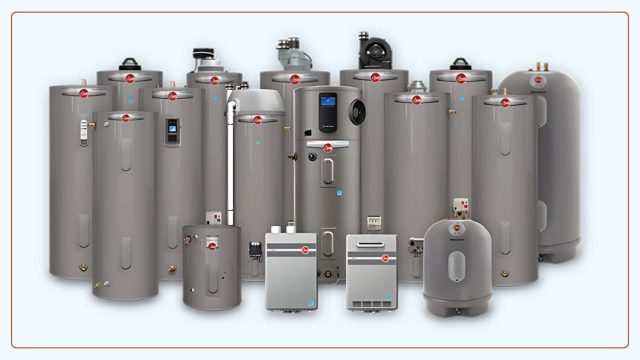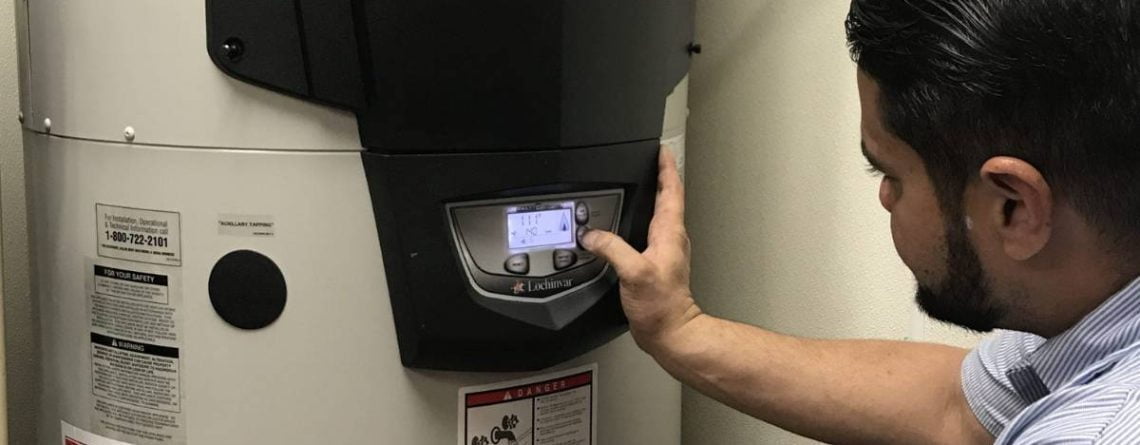How Much Does It Cost to Replace a Water Heater?
Replacing a water heater is rarely on anyone's to-do list, but when the need arises, having a clear understanding of costs can help you understand the cost factors of replacing a water heater. From the heater’s type and size to its location in your home, each factor affects the final cost. Knowing these details ahead of getting a new water heater installed will help you understand the cost. In this guide, we’ll walk you through each factor so you’ll better understand how much it cost to replace your old water heater.
In This Article:
- How Water Heater Technology (Type and Size) Affects Replacement Cost
- How Water Heater Location Increases Installation Cost
- How Re-Fitting Affects Installation Cost
- Cost of Changing from Electric to Gas Water Heaters
How Water Heater Technology (Type and Size) Affects Replacement Cost

When choosing a new water heater, different types and sizes come with their own price tags. The most affordable option is a standard 40Gal. electric water heater. While more advanced models, such as tankless water heater or hybrid water heater, have a higher upfront cost, they may offer significant savings over time. Let’s look at each option more closely:
Tank Heaters vs. Tankless Models: Tank heaters store and heat water continuously, providing hot water on demand but using more energy. Tankless models, which heat water only as needed, are more efficient but cost more to install. According to the U.S. Department of Energy, tankless water heaters can reduce energy costs by up to 34% for homes using up to 41 gallons of hot water daily. While this efficiency can save on energy bills, the initial cost is higher.
Hybrid Water Heaters: A hybrid water heater combines a traditional heating element with a heat pump, boosting energy efficiency even further. Although hybrids are pricier upfront, they can save homeowners significantly on utility bills over time. Continue reading all about hybrid water heaters
Breakdown of Average Costs: According to HomeGuide, a 40-gallon electric tank heater typically costs between $400 and $1,000, while gas-powered models range from $500 to $2,000. Tankless models vary widely, from $200 for single-point units to as high as $2,300 for whole-house systems. Hybrid models, also known as heat pump water heaters, generally fall between $1,200 and $2,500. Although the upfront costs are higher for tankless and hybrid models, their energy savings can make them a wise long-term investment.
How Water Heater Location Increases Installation Cost
The location of your water heater plays a significant role in installation cost. Generally, accessible locations reduce labor costs, while hard-to-reach spots, such as attics or closets, increase the complexity and expense of the job.
Accessible Locations: Installing a water heater in a garage or basement is often more affordable. Open spaces allow plumbers to work with fewer restrictions, cutting down on the time and tools required.
Hard-to-Reach Spots: Closets, attics, or other cramped areas may require additional time and specialized equipment, raising labor costs. For example, This Old House notes that power venting, often required in confined spaces, can add another $300 to $1,000 to your total.
Average Cost Increase: Installing a water heater in an accessible area typically costs between $500 and $1,000. For installations in more challenging locations, you may see an added expense of $200 to $500. If you're concerned about these added costs, consult your plumber to find ways to keep installation simple and affordable.
How Re-Fitting Affects Installation Cost
Replacing a water heater sometimes requires updates to existing plumbing or connections, especially if you're switching to a different type or brand of heater. This re-fitting process can add to your costs but is necessary for safety and compatibility.
Switching Models: Converting from a tank water heater to a tankless model often requires extensive plumbing adjustments. Additional electrical work may also be needed to support the tankless heater’s power demands. According to Angi, switching from a tank model to a tankless unit could cost an extra $500 to $1,200 in re-fitting.
Brand Compatibility: Even if you’re staying within the same model type, changing brands may require adjustments due to different connection points. Although typically minor, these modifications still add to both time and labor costs.
Impact of Re-Fitting: Re-fitting costs generally range from $300 to $800, depending on the extent of modifications needed. To ensure a smooth installation, discuss potential re-fitting costs with your plumber upfront, as these can vary significantly depending on the brand and model you select.
Cost of Changing from Electric to Gas Water Heaters
Switching from an electric water heater to a gas model may save on long-term energy costs, but it’s an involved process that can be expensive. This conversion requires professional work to meet local codes and ensure safety.
Gas Line Installation: A gas line is essential for gas water heaters, and its installation can be a considerable added cost. According to Angi, gas line installation typically ranges from $260 to $820, depending on the distance from the main line and other factors.
Venting and Permits: Unlike electric heaters, gas models require venting to expel emissions. Direct vent often use a chimney, while power vents use a fan to move exhaust out of the home. Venting installation can add another $300 to $1,500 to your project, as noted by This Old House. Additionally, local regulations require permits, which may cost between $100 and $300.
Average Cost for Conversion: The total cost for switching from electric to gas typically falls between $3,000 and $7,000, covering gas line installation, venting, and labor. Due to the safety requirements of gas systems, it’s essential to hire a licensed, gas-certified plumber to ensure everything meets local building codes.
Key Takeaways for Understanding How Much Water heater Replacement Cost
The total cost to replace a water heater depends on several factors, including the type and size of the unit, where it’s located, any necessary re-fitting, and energy source changes. By understanding these elements, you can better prepare for the investment, choose the most efficient option, and avoid last-minute surprises. For more detailed information on water heater replacements and tips for choosing the right option, continue reading our guide on replacing a water heater.

